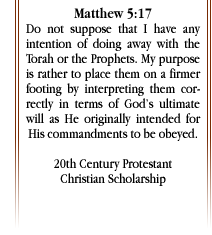 |

|
What Are the Biblical Feasts?
Yeshua wasn't born on December 25th (actually, he was born on the first day of the seventh month, 3 BCE, a Biblical feast day). He wasn't resurrected on Easter. He didn't celebrate Halloween or Valentines Day. In the pagan world, December 25th was a day to worship the "rebirth of the sun," the second Sunday after the Spring Equinox was the orgy to honor a Babylonian fertility goddess, February 14th was a day of wife swapping by lots, and October 31st was a day that disembodied souls roamed the earth.
Since Yeshua desired to obey his Father's instructions as a Tzedek (a righteous one), he celebrated the Appointed Times given to the children of Israel during their trip from Egypt to the Promised Land. These "Appointed Times", or Mo'deim, are to remind the children of Israel of the great things Yahweh has and will do for them. They are listed in Leviticus chapter 23, along with the requirements for Temple worship and appropriate conduct for those gatherings. They do not glorify sex and death, but rather blessings and spiritual uplifting.
In common vernacular, a moed is likened unto an appointment. ...It's sort of like a date - a special time between God and His people. Additional study will uncover that it is a rehearsal of God's 7000 year plan, culminating with the marriage of the Messiah to his bride. Looking to the future when Yeshua returns at his second coming, we see in Zechariah 14:16-19 and Ezekiel 45:21 these "appointed times" will be kept by everyone on the planet under penalty of punishment. So now we can understand through a correct translation of Colossians 2:16-17 that the feasts still foreshadow the plan of redemption, shadows that Yeshua has yet to fill.
Now that we can see that the feasts have not all been fulfilled, and that in observing them, we are rehearsing events still to come or remembering events that have passed, the entire plan of our Heavenly Father becomes much more clear.
These feasts were originally kept by the children of Israel prior to Yeshua's death and will be kept in the Millennial Kingdom by all people on the earth (See Zech. 14 for just one example). All who accept the finished work of Yeshua's atoning sacrifice become part of his new Ekklesia, The Commonwealth of Israel (see Ephesians 2:11-13). The apostles continued to observe them after the resurrection, and the gentiles in Asia (under the Apostle John's teaching) fought excommunication all the way up to the end of the second century to maintain the right to continue to keep them, refusing to succumb to the traditions that were attempting to be foisted upon them via the leadership in Rome. If you are wondering how that could be, historical evidence from the first century clearly shows that a liturgical calendar of the Hebraic kind existed in all the churches
(see point 12 at Hebrew Roots Beliefs ).
The evidence is very substantial so that as we seek the restoration of the "faith which was once for all delivered to the saints", we desire to recover the ways of those first followers of Yeshua and reject the traditions that compromise the truth just as they did.
As a friend of mine says, "Try 'em, you'll like 'em!"
|
|




